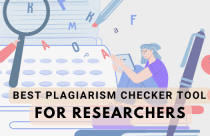5 Effective Ways to Avoid Ghostwriting for Busy Researchers

This article is also available in: Turkish, Spanish, Portuguese, and Russian
“….. and what do you think about it?” asked one of the researchers on the review panel. Stumped by it, you had no clue what the question meant—was it related to the introduction? some citation in the introduction? You were clueless about it! You were prepared with questions related to aims and objectives, methodology, results, all the graphs, and discussion too! Of course, you used a ghostwriter to write your paper! Your silence speaks it all and the panel is waiting for your reply, it looks like they have concluded your lack of knowledge, on what might have appeared to be the basic foundation of your research paper.
And then, dejected, you accept the fact that you did not really write the paper. You opted for ghostwriting! Although the experiments in the laboratory were conducted by you and the data was generated and analyzed by you, the manuscript, the paper you published was written by a ghostwriter, who took no credit for it!
What is Ghostwriting?
Ghostwriting is a practice wherein an individual makes a significant contribution to the manuscript and is yet not named as an author or a contributor. These writers are often found to work for medical communication agencies that carry out publishing of clinical trials studies. Thus, ghostwriting is common in journals that report large scale clinical trials and literature studies. Furthermore, many journals and editors allow professional medical writers to contribute to the papers. They do not list them as authors and acknowledge their role with remuneration.
However, scientific communication depends on trust and reliability on published literature i.e. to be able to believe what is read and trust the knowledge that is imparted. This is the biggest challenge in case of ghostwriting because the medical writers are not originally aware of the depth of the conducted research work.
What is the Role of a Ghostwriter in Research Publishing?
Research findings from various fields of study generate scientific data; it is on a large scale. This data is presented in a document format. In the field of research, writing original research and review papers is a challenging task. The notable medical writers ethically help researchers to convert their raw data into a research document. Therefore, medical writing agencies or independent writers write regarding the products or drugs overlooking their adverse effects. Pharmaceutical companies fund many ghostwriters to create a manuscript which is published in a reputed journal under a well renowned scientist (who may or may not be allowed to incorporate changes).
There are medical writing agencies, such as Medical Education and Communications Company (MECC) or American Medical Writers Association (AMWA), that identify ghostwriting malpractices in the field of scientific literature. Although ghostwriting service proves helpful for busy researchers who are not able to cater to the substantial literature review. This service is a scientific misconduct. Academic research publication rarely detects ghostwriting.
Ghostwriting Service – A Scientific Misconduct
Part of publishing a paper relies primarily on journal and authors reputation. If researchers happen to use the ghostwriting service, due to time constraints, they could be charged with professional misconduct. Ghostwriters draft the article under the name of reputed authors to publish it in leading journal. While this practice is not considered illegal yet, it is as an unethical practice and soon will be tackled with rules to curtail ghostwriting in the field of research. Some researchers genuinely struggle to publish their scientific data, and with the current research race to ‘Publish or Perish’, the need to publish the study as early as possible is important. However, with the growing availability of application-based language assistance tools, writing articles has become an effective exercise.
Tools to Assist Research Article Writing
1. Trinka AI
Trinka is an AI-powered English grammar checker tool used to improve your writing as well as language enhancements. As a writing assistant tool, Trinka works well for all kinds of writing but performs much better on academic and technical texts compared to most other tools. It corrects contextual spelling mistakes and advanced grammar errors by providing real-time writing suggestions. The result is more concise and impactful for professional and academic writing.
2. Enago Plagiarism Checker
Enago Plagiarism and AI Grammar Checker tool uses the advanced text similarity detection algorithms, in partnership with Turnitin, to check for plagiarism. It has the largest database on the internet with 91+ billion webpages as well as 82+ million scholarly articles. It delivers a comprehensive plagiarism report with plagiarism percentage score and color-coded system. You will understand how similar your paper is as compared to the published papers with the help of plagiarism percentage score. It performs plagiarism checkers out there. Another feature that sets this tool apart is – it also checks your paper for grammar errors and gives writing improvement suggestions powered by AI. You can download the tracked changes of MS word document to review the suggestion.
3. Trello
Trello is a work management app. It tracks team projects, highlights tasks, and gives the details of its completion. Furthermore, it allows the user to list and schedule activities, provide deadlines and show progress percentage. The user can create multiple board for different assignments.
4. Scopus
Collecting and analyzing literature for your research is of utmost importance. Scopus is a multidisciplinary citation database of peer-reviewed literature like, scientific journals, books, and conference proceedings. Research has become global and with interdisciplinary and collaborative researches on the go, it is essential to stay updated.
5. Mendeley
This tool manages references. Mendeley is a reference manager tool that helps researchers organize relevant references for their research paper. This tool helps organize your citations and research.
Avoid Ghostwriting with the Help of Reviewing Services
Peer Review Service
The peer review service handles some activities in the peer review process and puts best practices to research workflow. This service will help authors maintain and improve the outcome of their peer review process. This service suggests improvement in the manuscript based on the journal requirement and enhances the author, reviewer or editor experience. However, if you opt for ghostwriting service, you will have to share the references and data to the ghostwriter. He/she will not have any personal views on the journal in which you want to publish the article.
Proofreading & Formatting
There are many proofreading and formatting services that provide affordable and fast manuscript proofreading services which ease the publishing process. Proofreading focuses on correcting the errors in writing and helps enhance the language of the manuscript and formatting brings in the uniformity and helps adhere to the guidelines issued by journals for the authors. A ghostwriter cannot vouch for a feature like this.
Artwork Editing
To meet the journal’s technical requirements, the artwork editors revise/format the artwork for consistency and accuracy.
Initially, these applications will appear to be a challenge and assigning the writing task to a ghostwriter might look like a better option. But these applications give user-friendly interface and you will eventually get familiar with these tools. However, some researchers might choose unethical practices, while many others are genuine researchers struggling to keep up their laboratory responsibilities with their writing targets!
There is a blurred line between the use and misuse of ghost authorship. However, the research fraternity will see, how to some extent ghostwriting is distorting the scientific literature. It won’t be long before authors will be penalized for unethical practices and scientific misconduct. And the best way to avoid ghostwriting is to use the tools available for writing and organizing scientific research.
Tell us if you have used any of these tools or any other tools for writing your reviews or research papers? Did you like it? Would you recommend it to others? Write to us or leave a comment below!









